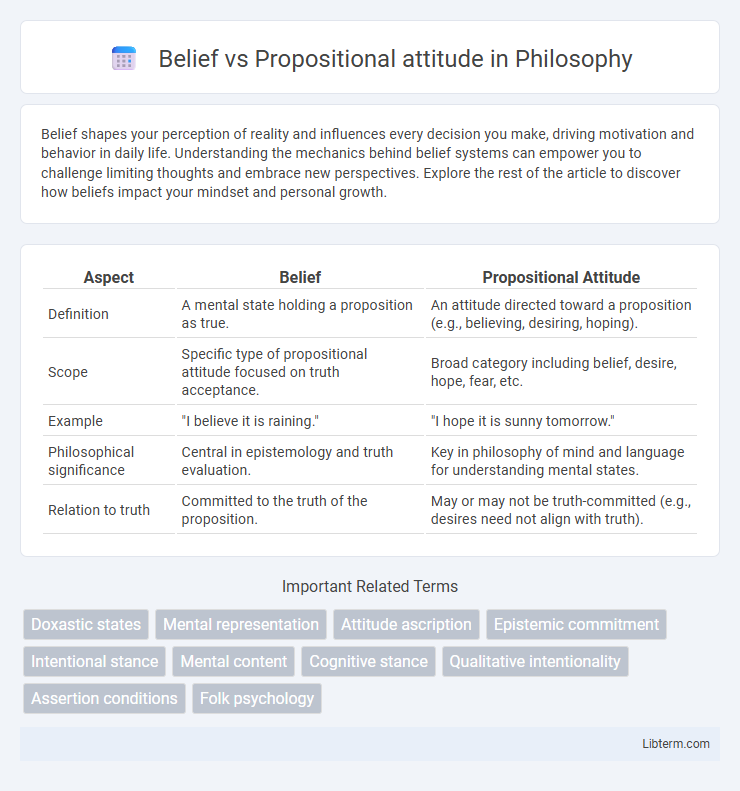Belief shapes your perception of reality and influences every decision you make, driving motivation and behavior in daily life. Understanding the mechanics behind belief systems can empower you to challenge limiting thoughts and embrace new perspectives. Explore the rest of the article to discover how beliefs impact your mindset and personal growth.
Table of Comparison
| Aspect | Belief | Propositional Attitude |
|---|---|---|
| Definition | A mental state holding a proposition as true. | An attitude directed toward a proposition (e.g., believing, desiring, hoping). |
| Scope | Specific type of propositional attitude focused on truth acceptance. | Broad category including belief, desire, hope, fear, etc. |
| Example | "I believe it is raining." | "I hope it is sunny tomorrow." |
| Philosophical significance | Central in epistemology and truth evaluation. | Key in philosophy of mind and language for understanding mental states. |
| Relation to truth | Committed to the truth of the proposition. | May or may not be truth-committed (e.g., desires need not align with truth). |
Understanding Belief: Core Definitions
Belief is a propositional attitude that reflects an individual's acceptance or endorsement of a specific proposition as true. Understanding belief involves recognizing it as a mental state directed toward the truth-value of statements or claims, distinguishing it from other attitudes like desire or hope. Core definitions highlight belief's role in guiding behavior and informing decision-making based on perceived information accuracy.
What is a Propositional Attitude?
A propositional attitude is a mental state held by an individual toward a proposition, such as believing, desiring, hoping, or fearing that a particular statement is true or false. It involves an intentional stance where the person relates to the content of a proposition, reflecting cognitive or emotional orientation toward that content. Propositional attitudes are fundamental in philosophy of mind and linguistics for understanding how people represent and respond to information.
Key Differences Between Belief and Propositional Attitude
Belief is a mental state where an individual accepts a proposition as true, whereas propositional attitudes encompass a broader category of mental states directed toward propositions, such as desire, hope, and fear. Key differences lie in belief's commitment to truth, contrasting with other propositional attitudes that reflect varying degrees of commitment or emotional investment. The distinction is crucial in philosophy of mind and cognitive science, as it clarifies how different mental states relate to information processing and rational behavior.
The Role of Truth in Belief and Propositional Attitudes
Beliefs are propositional attitudes that inherently involve a commitment to the truth of a specific proposition, serving as mental representations aligned with reality. Propositional attitudes encompass various mental states--such as desire, hope, or fear--where truth is not a necessary condition, differentiating them from belief's essential connection to truth. This distinction highlights that truth functions as a foundational criterion in belief formation, whereas other propositional attitudes may operate independently of truth-value considerations.
Varieties of Propositional Attitudes
Propositional attitudes encompass various mental states like belief, desire, hope, and fear, each reflecting different relations to propositions. Belief, a specific type of propositional attitude, represents acceptance that a proposition is true, while others like desire or hope indicate preference or aspiration toward a proposition's outcome. Understanding these varieties clarifies how individuals mentally engage with information, influencing cognition and behavior.
Philosophical Debates: Belief vs Propositional Attitude
Philosophical debates about belief versus propositional attitudes center on the distinction between an individual's mental state and the content that state relates to. Belief is often treated as a specific type of propositional attitude, where the mind commits to the truth of a proposition, whereas propositional attitudes encompass a broader range of mental stances like desire, hope, and fear toward propositions. These debates challenge how language, intention, and cognition interact in understanding mind and meaning within analytic philosophy.
Cognitive Functions of Beliefs and Attitudes
Beliefs serve as cognitive representations that shape an individual's understanding of reality, influencing perception, memory, and decision-making processes. Propositional attitudes, including beliefs and desires, function as mental states that relate the individual to specific propositions, framing how information is accepted, rejected, or evaluated cognitively. These cognitive functions underpin reasoning mechanisms, guiding behavior by integrating subjective attitudes with objective information processing.
Examples Illustrating Belief and Propositional Attitude
Belief refers to a psychological state where a person holds a proposition to be true, such as believing that "the sky is blue." Propositional attitudes encompass a broader category of mental states directed towards a proposition, including belief, desire, hope, and fear, for example, hoping that "it will rain tomorrow" or fearing that "the meeting will be canceled." Illustrations of these concepts demonstrate that while belief asserts the truth of a proposition, propositional attitudes reflect varied mental stances one can adopt toward the same proposition.
Implications in Psychology and Cognitive Science
Belief and propositional attitude are central concepts in psychology and cognitive science, influencing how mental states are represented and processed. Understanding belief as a mental state directed towards the truth of a proposition allows researchers to model cognitive processes such as reasoning, decision-making, and theory of mind more accurately. The distinction impacts the development of artificial intelligence and cognitive models by elucidating how individuals attribute mental content and predict behavior based on various attitudes toward propositions.
Conclusion: Synthesizing Belief and Propositional Attitude
Belief and propositional attitudes both represent mental states directed at propositions but differ in their complexity and contextual application. Synthesizing belief with other propositional attitudes like hope or doubt enhances understanding of cognitive processes and decision-making frameworks. Integrating these concepts is crucial for advancing philosophical theories and artificial intelligence models that simulate human thought patterns.
Belief Infographic

 libterm.com
libterm.com